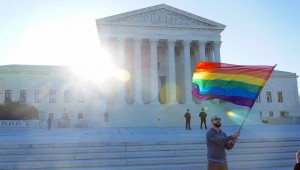Supreme Court To Likely Resolve LGBTQ Title VII Issues
The high court will finally settle the circuit-splitting issue.

(Photo by Ted Eytan / Flickr)
SCOTUS indicated today that it will finally settle the circuit-splitting issue of whether gay and transgender status falls under the protection of Title VII. The Court signaled this when it agreed on April 22, 2019, to hear three cases that have been appealed to the high court. The three cases are: Altitude Express v. Zarda; Bostock v. Clayton County, Georgia; and R.G. & G.R. Harris Funeral Homes Inc. v. EEOC. I’ve previously covered these cases and issues here and here.
In Zarda v. Altitude Express, Mr. Zarda (through his estate, as he perished in a BASE-jumping accident after filing his lawsuit) contends that his employer fired him because of his sexual orientation. A three-judge Second Circuit panel first ruled that the appellant had no claim for sex discrimination under Title VII because sexual orientation was not covered by the law.

Curbing Client And Talent Loss With Productivity Tech
Then, however, the Second Circuit reversed itself in an en banc decision (which means all of the Second Circuit judges came together to hear the case as opposed to a three-judge panel). The Second Circuit then held that that sexual orientation discrimination is discrimination “because of” sex under Title VII, ruling in Mr. Zarda’s favor. The Second Circuit’s decision aligns with the decision from the Seventh Circuit in Hively v. Ivy Tech.
Mr. Zarda’s case is also particularly noteworthy not only because of the important contemporary legal issue it presents, but also because while at the Second Circuit it exposed a rare public divide between two federal agencies: The Equal Employment Opportunity Commission and the Department of Justice. Both agencies filed supplemental briefs in the case, with the EEOC arguing that Title VII applies to sexual orientation while the DOJ argued that it does not.
Like the Zarda case, the second case — Bostock v. Clayton County, Georgia — presents the issue of whether sexual orientation is protected under Title VII. In the Bostock case, a three-judge panel from the Eleventh Circuit held that that Title VII did not prohibit discrimination based on sexual orientation. The plaintiff-appellant requested that that the full court hear the case en banc as in Zarda, but the court declined to do so.
The third case, EEOC v. R.G. & G.R. Harris Funeral Homes, Inc., is a case brought by plaintiff Aimee Stephens, a transgender woman who worked as a funeral director in Michigan. She presented as a male when she started her job, but then told her supervisor several years later that she was planning to transition to a woman and would start wearing women’s clothes to work. She was fired shortly after that.
Sponsored

Generative AI at Work: Boosting e-Discovery Efficiency for Corporate Legal Teams

AI Presents Both Opportunities And Risks For Lawyers. Are You Prepared?

Law Firm Business Development Is More Than Relationship Building

Generative AI at Work: Boosting e-Discovery Efficiency for Corporate Legal Teams
Her supervisor said he fired her because Stephens “was no longer going to represent himself as a man.” The supervisor stated in the case that he believes gender transition “violat[es] God’s commands” since “a person’s sex is an immutable God-given fit.”
The EEOC sued on Stephens’s behalf in federal district court in Michigan, claiming discrimination in violation of Title VII. The district court held Stephens was discriminated against because it engaged in sex stereotyping, but that the employer was protected by the Religious Freedom Restoration Act. Stephens appealed.
The Sixth Circuit agreed with Stephens that Title VII bars employment discrimination against transgender people because: (1) transgender discrimination is gender stereotyping; and (2) transgender discrimination is inherently sex discrimination since such a decision must be “motivated, at least in part, by the employee’s sex.” The Sixth Circuit then held that the employer was not protected by the Religious Freedom Restoration Act, reversing the district court.
As these cases proceed before the Supreme Court, we will continue to monitor and provide updates.
Sponsored


Curbing Client And Talent Loss With Productivity Tech
 Evan Gibbs is an attorney at Troutman Sanders, where he primarily litigates employment cases and handles traditional labor matters. Connect with him on LinkedIn here, or e-mail him here. (The views expressed in this column are his own.)
Evan Gibbs is an attorney at Troutman Sanders, where he primarily litigates employment cases and handles traditional labor matters. Connect with him on LinkedIn here, or e-mail him here. (The views expressed in this column are his own.)







